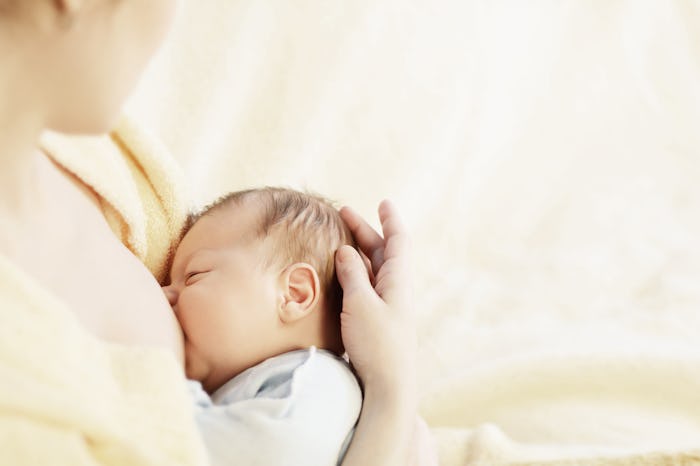Life

A New Study On Drinking Alcohol While Breastfeeding May Be Misleading For Parents
Drinking alcohol while nursing is a hotly debated topic that's both complicated and complex. In the past, doctors have suggested that no amount of alcohol is good during breastfeeding, but studies published in recent years have shown that light to moderate alcohol consumption is relatively safe, and won't harm an infant. Now, there's data that may throw that into question: New research has found that drinking alcohol while breastfeeding affects a baby's cognitive function. But that research may actually be misleading.
A new study published Monday in the journal Pediatrics suggests that children exposed to alcohol while breastfeeding were associated with a drop in cognitive abilities, according to CNN. In particular, researchers from Macquaire University in Australia analyzed data from a longitudinal study of more than 5,000 Australian infants evaluated every two years until 11 years old, and discovered that those babies whose mothers drank while nursing had lower nonverbal reasoning scores around 6 and 7 years old, compared to those those kids who never breastfed, CNN reported.
But the conclusion drawn by the Pediatrics study has come into question. How come? Because the adverse effect on nonverbal reasoning skills was not present when the kids got older, according to Forbes.
Specifically, the study results showed that the impact on cognitive function wasn't maintained when the children were assessed at 10 and 11 years old, Forbes reported. In other words, the breastfed kids whose moms drank while nursing had skills comparable to their peers when they reached the fourth or fifth grade.
Dr. Melissa Bartick, an assistant professor of medicine at Cambridge Health Alliance and Harvard Medical School, who was not involved in the study, told CNN:
If you have a small effect to begin with and it lasts to, say, age 6 or 7, chances are by the time the child gets older, other environmental factors will start to play a bigger role.
The Australian research team also looked at the impact of smoking while breastfeeding on cognitive function, but that didn't show to have any effect, CNN reported. Of course, this doesn't mean smoking isn't harmful — as research shows, smoking while breastfeeding can inhibit milk production and reduce the amount of vitamin C your baby receives through your milk, according to Kelly Mom.
The fact that there's some dispute over the findings of the recent Pediatrics study is enough to suggest more research is needed into how drinking alcohol while breastfeeding affects cognitive function. Although the researchers were able to show some type of correlation, there are just too many variables to come to a definitive conclusion, as Forbes pointed out.
More so, the study leaves a few important questions unanswered, according to experts who spoke with CNN. There is no indication of how much alcohol was consumed by these moms during pregnancy, nor do researchers indicate whether these parents breastfed exclusively, or if they may have supplemented with formula. And the data, according to CNN, also fails to answer how much alcohol is safe to drinking while breastfeeding — if any amount is safe, at all.
Still, even with the study limitations and need for more research, parents should minimize their alcohol intake during lactation. The U.S. Centers for Disease Control and Prevention recommends abstaining from alcohol during breastfeeding, but does recognize that drinking alcohol in moderation — meaning up to one drink a day — doesn't show an adverse effect on babies as long as you wait two hours to nurse in order for the concentration of alcohol to minimize in ingested milk. (It's a position also held by the American Academy of Pediatrics.)
The Pediatrics study, when considered with other research, does help parents better understand the possible impact drinking alcohol during breastfeeding may have on their child. But when taken on its own, the research leaves a lot to be desired, and instead, may lead more to unwarranted concern-trolling over a person's decision on how to take care of their child, as Forbes reported.
And that's the last thing parents need.